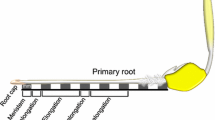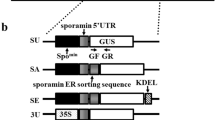Abstract
The expression of the Arabidopsis heat-shock protein (HSP) 18.2 promoter β-d-glucuronidase (GUS) chimera gene was studied in various organs of the transgenic Nicotiana plumbaginifolia during the recovery phase at normal temperatures (20–22 °C) following heat-shock (HS) treatment. The optimum HS temperature for GUS activity in the anthers, petals and capsules was 42 °C, but in immature seeds and the placentas of capsules it was 36 °C and 39 °C, respectively. No apparent GUS activity was observed in any organs except for dry seeds after HS at 45 °C, although the activity in dry seeds was apparent even after HS at 48 °C. After HS at 42 °C, GUS activity in the flower tissues was the highest before anthesis and declined thereafter.
Similar content being viewed by others
Author information
Authors and Affiliations
Additional information
Received: 13 January 1998 / Revision received: 25 January 1999 / Accepted: 3 March 1999
Rights and permissions
About this article
Cite this article
Moriwaki, M., Yamakawa, T., Washino, T. et al. Organ-specific expression of β-glucuronidase activity driven by the Arabidopsis heat-shock promoter in heat-stressed transgenic Nicotiana plumbaginifolia. Plant Cell Reports 19, 92–95 (1999). https://doi.org/10.1007/s002990050716
Issue Date:
DOI: https://doi.org/10.1007/s002990050716




